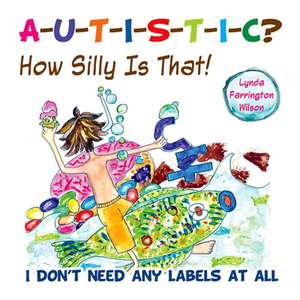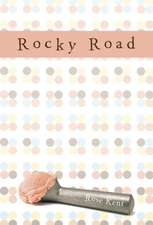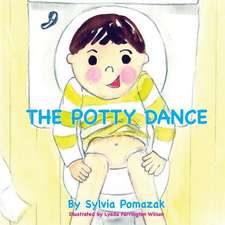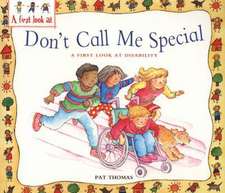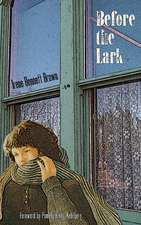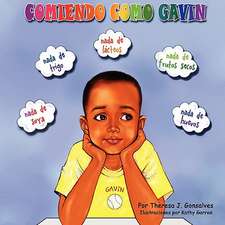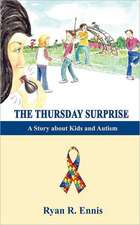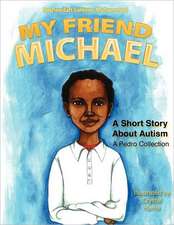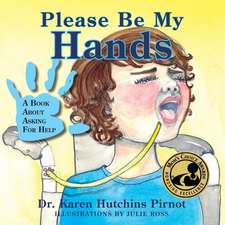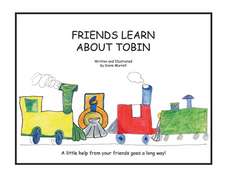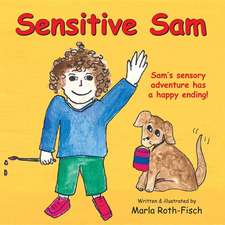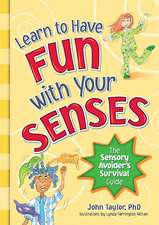Autistic? How Silly Is That!: I Don't Need Any Labels at All
Autor Lynda Farrington Wilsonen Limba Engleză Paperback – 31 mar 2012 – vârsta de la 4 până la 9 ani
The first book of its kind that tells children with autism they are KIDS with autism, as it gently pokes fun of the onerous label "autistic". The readers will feel better about themselves after reading about their new friend, the narrator, who also HAS autism, as well as many other more important characteristics. Having autism is just one small part of his overall character and humanity. And we would never again label him as simply "autistic".
Preț: 51.35 lei
Nou
Puncte Express: 77
Preț estimativ în valută:
9.83€ • 10.67$ • 8.25£
9.83€ • 10.67$ • 8.25£
Carte disponibilă
Livrare economică 02-16 aprilie
Preluare comenzi: 021 569.72.76
Specificații
ISBN-13: 9781935274599
ISBN-10: 1935274597
Pagini: 23
Dimensiuni: 203 x 203 x 3 mm
Greutate: 0.09 kg
Editura: FUTURE HORIZONS
ISBN-10: 1935274597
Pagini: 23
Dimensiuni: 203 x 203 x 3 mm
Greutate: 0.09 kg
Editura: FUTURE HORIZONS
Recenzii
"This sweet and endearing book offers youngsters a fresh perspective on autism, by helping them understand that autism is just one small facet of who they are!"
ߝ Rebecca Moyes, MEd, author of Visual Techniques for Developing Social Skills and Building Sensory Friendly Classrooms and mother of a young man with Asperger's syndrome
ߝ Rebecca Moyes, MEd, author of Visual Techniques for Developing Social Skills and Building Sensory Friendly Classrooms and mother of a young man with Asperger's syndrome
This is a great picture storybook that over-exaggerates the “titistics” of most everything we do and are.
For both parents and children who are getting this diagnosis for the first time, it does definitely take the “sting” out of the words and replaces it with a spontaneous smile.
Children and parents will easily get the message that there are no real labels for anything, and at the same time there are labels for everything, if we want them!
This is a beautifully illustrated and well written book that can be used 1-1 or in groups with children or at parent information meetings by a seminar facilitator.
Thank you Lynda!!
Susan N. Schriber Orloff, OTR/L
CEO/Executive Director
Children's Special Services, LLC
For both parents and children who are getting this diagnosis for the first time, it does definitely take the “sting” out of the words and replaces it with a spontaneous smile.
Children and parents will easily get the message that there are no real labels for anything, and at the same time there are labels for everything, if we want them!
This is a beautifully illustrated and well written book that can be used 1-1 or in groups with children or at parent information meetings by a seminar facilitator.
Thank you Lynda!!
Susan N. Schriber Orloff, OTR/L
CEO/Executive Director
Children's Special Services, LLC
Notă biografică
Lynda Farrington Wilson is an artist and former marketing executive whose talents and experiences have culminated in writing, illustrating and advocating for children with autism and with sensory processing disorders. Living in North Carolina, Lynda and her husband have three beautiful sons. The youngest is a funny, brilliant and talented sensory-seeker who has autism. She is certified in the Affect-Based Language Curriculum and has created social and independent skill development programs using peer models in the classroom.
Lynda has illustrated several books. Her first book, endorsed by Temple Grandin, Squirmy Wormy: How I Learned to Help Myself, helps children understand their sensory issues while providing easy every day activities for self-regulation. When not advocating, Lynda enjoys capturing life’s moments in custom pencil portraits and playing in the mud on the potter’s wheel.
Lynda has illustrated several books. Her first book, endorsed by Temple Grandin, Squirmy Wormy: How I Learned to Help Myself, helps children understand their sensory issues while providing easy every day activities for self-regulation. When not advocating, Lynda enjoys capturing life’s moments in custom pencil portraits and playing in the mud on the potter’s wheel.
Comentariile autorului
The incidence of autism has grown exponentially in the past decade, bringing new challenges in how to educate, integrate, and approach a child with autism. I have sat in many an IEP meeting where my son, Tyler, was referred to as autistic—not as a good student, a Boy Scout, a violin player, or a sweet and caring young man, but just autistic. In contrast, when I suggested that my son spend time in his school’s sensory room, a teacher told me she didn’t want him to be around those “autistic kids” because it might set him back (in this case, those “autistic kids” she was referring to were children on the lower-functioning end of the autism spectrum, as compared to Tyler). How sad on both accounts—that our children are referred to by their disability first and as people second.
Some may find my viewpoint debatable, as there are many people on the autism spectrum that find identity, inclusion, or even solace in the label of autistic, and I respect that. I, too, can introduce myself as an author, artist, mother, or gardener, which is my choice of an identity on any given day or situation. However, when we label our children, especially in a way that can negate all their other gifts and talents, we’ve altered society’s perception of that child, and, with that, we may even be prohibiting their academic and social advancement.
With advocacy, our society as a whole has become “socially corrected” on many labels used for ethnic groups, disabilities, and the like. The guidelines of the American Medical Association style manual and that of the American Psychological Association suggest that we avoid language that objectifies a person by his or her condition (eg, “autistic”). They advise that we use “people-first” language, instead of focusing on an individual’s disability or chronic condition (such as substituting the phrase, “with autism”).
This book is my advocacy, to help the world see the exceptional brilliance in our children with autism. There isn’t a day that goes by that I am not in awe of my son Tyler’s mind and how he approaches the world in a way unlike mine, but better in so many ways. I’ve often thought that perhaps the pureness of mind and spirit that people on the autism spectrum bring to us may be an evolution that is meant to heal our broken world and even our hearts. I pray each day that I am worthy of Tyler and the hard, hard challenges he works to overcome. I am mindful that his success will be built upon opportunity, not a restrictive label that may bring fear, prejudice, and alienation. I hope you enjoy A-U-T-I-S-T-I-C? How Silly Is That!, my poignant yet lighthearted approach to educating people of all ages about how autism is just a small part of a whole person.
Some may find my viewpoint debatable, as there are many people on the autism spectrum that find identity, inclusion, or even solace in the label of autistic, and I respect that. I, too, can introduce myself as an author, artist, mother, or gardener, which is my choice of an identity on any given day or situation. However, when we label our children, especially in a way that can negate all their other gifts and talents, we’ve altered society’s perception of that child, and, with that, we may even be prohibiting their academic and social advancement.
With advocacy, our society as a whole has become “socially corrected” on many labels used for ethnic groups, disabilities, and the like. The guidelines of the American Medical Association style manual and that of the American Psychological Association suggest that we avoid language that objectifies a person by his or her condition (eg, “autistic”). They advise that we use “people-first” language, instead of focusing on an individual’s disability or chronic condition (such as substituting the phrase, “with autism”).
This book is my advocacy, to help the world see the exceptional brilliance in our children with autism. There isn’t a day that goes by that I am not in awe of my son Tyler’s mind and how he approaches the world in a way unlike mine, but better in so many ways. I’ve often thought that perhaps the pureness of mind and spirit that people on the autism spectrum bring to us may be an evolution that is meant to heal our broken world and even our hearts. I pray each day that I am worthy of Tyler and the hard, hard challenges he works to overcome. I am mindful that his success will be built upon opportunity, not a restrictive label that may bring fear, prejudice, and alienation. I hope you enjoy A-U-T-I-S-T-I-C? How Silly Is That!, my poignant yet lighthearted approach to educating people of all ages about how autism is just a small part of a whole person.
Extras
If I catch a fish, am I fishertistic, and if I cook the fish would that make me culinaritistic too?
WHEW! Ridiculous! I don’t need any labels at all.
I’m just a typical person, with my own likes and dislikes, strengths and weaknesses, hopes and dreams, who approaches the world a little differently… but many times, better.
I’m a brilliant person WITH autism.
Autistic? How silly is that!
Descriere
The first book of its kind that tells children with autism that they are more than a label and encourages readers through a humorous narrator who explores all of his personable characteristics.
